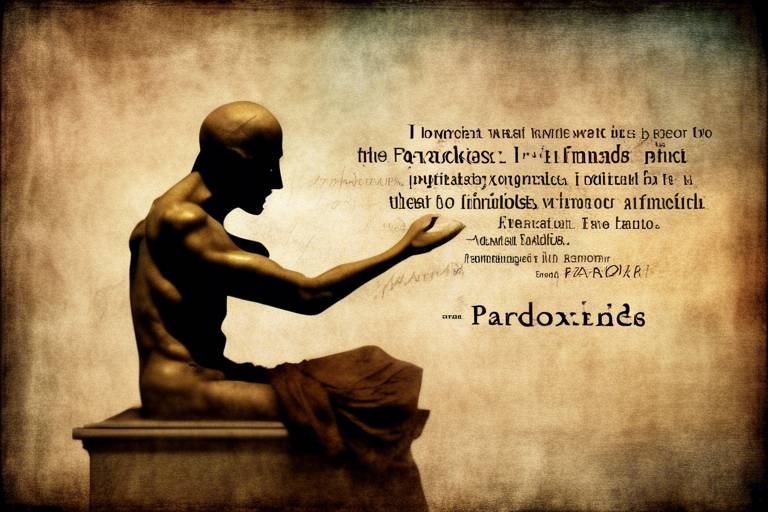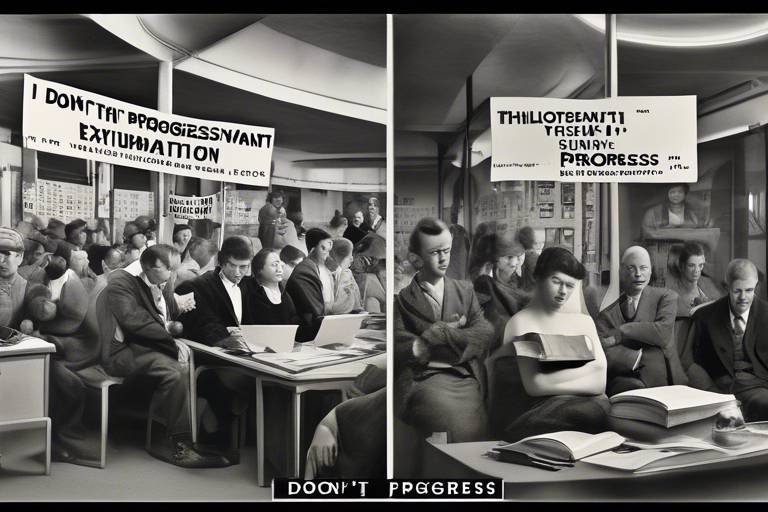How Valuable is the Concept of Virtue in Philosophy?
The concept of virtue has been a cornerstone of philosophical inquiry for centuries, shaping our understanding of ethics and moral character. But why is virtue so significant? Imagine virtue as the compass guiding us through the murky waters of moral dilemmas. It helps us navigate complex decisions, ensuring that we not only act rightly but also cultivate a character that reflects our highest ideals. In a world where ethical standards often seem fluid, the enduring relevance of virtue provides a stable foundation for personal integrity and societal norms.
At its core, virtue is about character development. It’s not just about knowing what is right; it’s about embodying it. This transformative journey requires ongoing effort and reflection, akin to an artist honing their craft. Just as a sculptor chisels away at stone to reveal a masterpiece, we too must actively cultivate virtues to reveal our best selves. The value of virtue extends beyond individual character; it influences our interactions and relationships, creating a ripple effect that can elevate entire communities.
Moreover, examining the implications of virtue leads us to explore various philosophical perspectives. Different schools of thought, from Aristotelian ethics to Stoicism, offer unique insights into what it means to live virtuously. Each perspective contributes to a richer understanding of moral character and ethical behavior. For instance, Aristotelian virtue ethics emphasizes the importance of practical wisdom and the pursuit of the golden mean, while Stoicism focuses on inner strength and self-control. These diverse interpretations not only enrich philosophical discourse but also provide practical frameworks for everyday living.
In contemporary discussions, the concept of virtue remains relevant, especially in the context of moral responsibility and social justice. As we confront pressing global issues, the virtues we cultivate can guide our actions and decisions, fostering a sense of accountability and ethical engagement. For instance, virtues such as empathy and fairness are crucial in advocating for social justice, reminding us of our moral obligations toward others. In this way, virtue is not a relic of the past but a vital component of our ongoing ethical evolution.
In conclusion, the value of virtue in philosophy cannot be overstated. It serves as a guiding principle for personal growth, ethical decision-making, and social responsibility. By embracing virtue, we not only enhance our own lives but also contribute to a more just and compassionate society. As we continue to navigate the complexities of modern life, let us remember the profound impact that cultivating virtue can have, not just on ourselves, but on the world around us.
- What is the definition of virtue in philosophy? Virtue in philosophy refers to moral qualities or traits that are deemed to be good and desirable, guiding individuals toward ethical behavior.
- Why is virtue important in ethics? Virtue is important in ethics because it shapes character and influences moral decisions, helping individuals to act in accordance with their values and principles.
- How do different philosophical traditions view virtue? Different traditions, such as Aristotelian ethics, Stoicism, and Confucianism, offer unique interpretations of virtue, focusing on aspects like character development, self-control, and social harmony.
- Can virtue be cultivated? Yes, virtue can be cultivated through intentional practice, reflection, and the pursuit of moral excellence in everyday life.

The Historical Context of Virtue
Understanding the historical context of virtue is like peeling back the layers of an onion; each layer reveals a new perspective that has shaped our current understanding of ethics and morality. Virtue has been a central theme in philosophical discourse for centuries, influencing how societies define and uphold moral standards. From the ancient Greeks to modern thinkers, the concept of virtue has evolved, reflecting the changing moral paradigms and cultural influences that have shaped human behavior.
In ancient Greece, virtue was not merely a personal quality but a societal expectation. Thinkers like Plato and Aristotle laid the groundwork for virtue ethics, emphasizing that a virtuous life leads to eudaimonia, or human flourishing. Plato, in his dialogues, argued that virtue is knowledge; if one truly understands what is good, they will act accordingly. Aristotle, however, took a more pragmatic approach, suggesting that virtues are habits that can be developed through practice and that they lie between extremes—a concept known as the Golden Mean.
As we moved into the Roman era, the Stoics emerged, offering a different perspective on virtue. They believed that virtue is the only true good and that external circumstances do not determine one's happiness. For Stoics, the cultivation of inner strength and self-control was paramount, allowing individuals to navigate life's challenges with grace and resilience. This idea of virtue as an internal compass rather than an external measure resonated through the ages, influencing later ethical theories.
Fast forward to the Middle Ages, where virtue took on a religious dimension. Christian philosophers like Aquinas integrated Aristotelian ethics with Christian theology, proposing that virtues are gifts from God that help individuals align with divine will. This period saw the emergence of the cardinal virtues (prudence, justice, fortitude, and temperance) and the theological virtues (faith, hope, and charity), shaping moral discourse in a way that emphasized both personal and communal responsibilities.
In the Enlightenment, thinkers like Kant shifted the focus of virtue from character to duty, arguing that moral actions are those performed out of a sense of obligation rather than personal gain. This introduced a more formalized approach to ethics, where virtue was tied to rationality and universal moral laws. However, this perspective often overlooked the importance of emotional intelligence and personal relationships in ethical decision-making.
Today, the historical context of virtue continues to inform contemporary ethical discussions. Modern philosophers recognize that virtue is not static; it evolves with societal norms and individual experiences. For instance, the rise of virtue ethics in the late 20th century reflects a renewed interest in character and moral psychology, emphasizing that virtues are essential for navigating complex moral landscapes.
In summary, the historical journey of virtue is a rich tapestry woven with diverse philosophical threads. Each era has contributed to our understanding of what it means to be virtuous, and as we continue to grapple with ethical dilemmas in today's world, the lessons from the past remain invaluable. The ongoing dialogue about virtue not only helps us understand ourselves better but also encourages us to cultivate a moral character that can lead to a more just and compassionate society.

Major Philosophical Theories on Virtue
The concept of virtue has been a cornerstone of philosophical inquiry for centuries, and various theories have emerged to interpret its significance. Each philosophical tradition brings its own unique perspective, enriching our understanding of what it means to be virtuous. Among the most influential theories are Aristotelian virtue ethics, Stoicism, and Confucianism. Let’s dive into these major philosophical frameworks, exploring how they define virtue and its implications for ethical living.
Aristotle, one of the most prominent figures in Western philosophy, proposed a vision of ethics centered on the development of character. In his view, virtue is not merely about following rules or adhering to laws; rather, it’s about cultivating personal qualities that enable individuals to lead fulfilling lives. Aristotle introduced the concept of the golden mean, which suggests that virtue lies in finding a balance between extremes. For example, courage is a virtue that exists between the extremes of recklessness and cowardice. This balance is essential for achieving moral excellence and living a flourishing life.
The golden mean serves as a guiding principle in Aristotelian ethics, advocating for moderation in all virtues. Aristotle believed that by practicing moderation, individuals could develop a well-rounded character. This principle can be applied to various virtues, such as:
- Courage: Balancing between recklessness and cowardice.
- Generosity: Finding the midpoint between prodigality and stinginess.
- Temperance: Maintaining moderation between indulgence and self-denial.
By adhering to the golden mean, individuals can navigate the complexities of ethical decision-making and cultivate a virtuous character.
Another crucial aspect of Aristotelian virtue ethics is the concept of practical wisdom, or phronesis. This form of wisdom is not just theoretical knowledge; it involves the ability to apply virtues in real-life situations. Practical wisdom enables individuals to make sound ethical judgments and navigate complex moral dilemmas. Aristotle argued that without practical wisdom, virtues can become ineffective or misapplied. For instance, a person may possess the virtue of honesty but may struggle to apply it appropriately in a situation where telling the truth could harm someone. Therefore, practical wisdom is essential for aligning one’s actions with virtuous intentions.
In contrast to Aristotelian ethics, Stoicism presents a distinctive perspective on virtue that emphasizes inner strength and self-control. Stoic philosophers, such as Epictetus and Seneca, believed that virtue is the only true good and that external circumstances should not dictate one’s moral character. For Stoics, living in accordance with nature and reason is paramount. They argue that by cultivating virtues such as wisdom, courage, justice, and temperance, individuals can achieve tranquility and resilience in the face of life’s challenges.
Stoicism teaches that emotions should be managed through rational thought, allowing individuals to maintain their composure and moral integrity even in adverse situations. This approach fosters a sense of personal responsibility, as individuals are encouraged to focus on what they can control—their thoughts, actions, and responses to external events.
On the other side of the globe, Confucianism offers a profound understanding of virtue that emphasizes social harmony and moral relationships. Confucius believed that virtues such as ren (benevolence), li (proper conduct), and xiao (filial piety) are essential for creating a just and harmonious society. In Confucian thought, moral character is developed through education, reflection, and the practice of virtues in everyday life.
Unlike the more individualistic approaches of Aristotle and the Stoics, Confucianism places a strong emphasis on the importance of community and familial relationships. Virtue, in this context, is not just a personal endeavor but a collective responsibility. By fostering virtuous behavior in individuals, society as a whole can thrive, leading to a more equitable and harmonious world.
In conclusion, the exploration of these major philosophical theories on virtue reveals its multifaceted nature. Whether through Aristotelian ethics, Stoicism, or Confucianism, the emphasis on character development and moral responsibility remains a consistent theme. Understanding these theories can help us cultivate virtues in our lives, contributing to personal growth and societal well-being.
1. What is the significance of virtue in philosophy?
Virtue is crucial in philosophy as it shapes ethical theories and influences how individuals understand morality and character development. Philosophers explore virtue to provide frameworks for living a good life.
2. How does Aristotle define virtue?
Aristotle defines virtue as a disposition to act in ways that benefit both the individual and society. He emphasizes the importance of the golden mean, where virtue lies between extremes of behavior.
3. What is practical wisdom?
Practical wisdom, or phronesis, is the ability to apply virtues in real-life situations. It is essential for making sound ethical judgments and navigating complex moral dilemmas.
4. How does Stoicism view virtue?
Stoicism views virtue as the only true good and emphasizes the importance of inner strength and self-control. Stoics believe that by cultivating virtues, individuals can achieve tranquility and resilience.
5. What role does Confucianism play in understanding virtue?
Confucianism emphasizes the importance of virtues in social harmony and moral relationships. It teaches that cultivating virtues not only benefits the individual but also contributes to a just and harmonious society.

Aristotelian Virtue Ethics
Aristotelian virtue ethics is a profound philosophical framework that emphasizes the importance of character in ethical decision-making. Unlike other ethical theories that may focus solely on rules or consequences, Aristotle posits that a person's character is central to living a flourishing life. According to Aristotle, virtues are not just abstract concepts; they are qualities that individuals cultivate to achieve their full potential. This cultivation of virtues leads to a state of eudaimonia, often translated as "happiness" or "human flourishing," which is the ultimate goal of human life.
At the heart of Aristotelian ethics is the concept of the golden mean. This principle advocates for moderation in all virtues, suggesting that virtue lies between two extremes: excess and deficiency. For example, courage is a virtue, but it exists between the extremes of recklessness (excess) and cowardice (deficiency). Aristotle believed that finding this balance is essential for moral excellence. The golden mean is not a one-size-fits-all solution; instead, it requires practical wisdom, or phronesis, to discern the right course of action in various situations.
Practical wisdom is crucial in applying virtues to real-life scenarios. It is the ability to make sound judgments based on experience, context, and moral understanding. Aristotle argued that practical wisdom allows individuals to navigate complex moral dilemmas effectively. For instance, in a situation where one must choose between honesty and compassion, practical wisdom helps determine the best course of action that aligns with virtuous behavior. This quality is not merely theoretical; it is developed through practice and reflection over time.
In summary, Aristotelian virtue ethics provides a holistic approach to morality that prioritizes character development and practical wisdom. By cultivating virtues and striving for the golden mean, individuals can lead lives that are not only ethically sound but also rich and fulfilling. This perspective highlights that ethics is not just about knowing what is right or wrong; it's about becoming a better person through the continuous practice of virtue.
- What is the main focus of Aristotelian virtue ethics?
Aristotelian virtue ethics focuses on the development of character and virtues, emphasizing that a good life is achieved through cultivating moral qualities. - What does the golden mean represent in Aristotelian ethics?
The golden mean represents the ideal balance between two extremes, where virtue lies. For example, courage is the mean between recklessness and cowardice. - How does practical wisdom play a role in virtue ethics?
Practical wisdom is essential for applying virtues in real-life situations, helping individuals make ethical decisions based on context and experience.

The Golden Mean
The concept of the Golden Mean is central to Aristotelian ethics and serves as a profound guiding principle for achieving moral excellence. Aristotle proposed that virtue lies between two extremes, which he termed vices. For instance, courage is the mean between recklessness (excess) and cowardice (deficiency). This idea isn't just a philosophical abstraction; it offers a practical framework for navigating the complexities of ethical decision-making in our daily lives.
Imagine you're at a buffet, faced with an array of delicious food. If you indulge without restraint, you might find yourself feeling sluggish and regretful later on. Conversely, if you deny yourself entirely, you miss out on the joy of sharing a meal with friends. The Golden Mean advocates for balance, encouraging you to enjoy the feast while maintaining moderation. This balance is not only applicable to food but extends to all areas of life, including emotions, actions, and desires.
To better understand this concept, consider the following table that illustrates various virtues and their corresponding vices:
| Virtue | Excess (Vice) | Deficiency (Vice) |
|---|---|---|
| Courage | Recklessness | Cowardice |
| Generosity | Prodigality | Stinginess |
| Temperance | Intemperance | Insensibility |
This table highlights how each virtue is not merely a standalone trait but exists in relation to its opposites. Understanding this relationship allows individuals to cultivate a well-rounded character. Aristotle believed that achieving the Golden Mean requires practical wisdom, or phronesis, which is the ability to apply knowledge to real-life situations. It’s about making the right choices at the right time, considering the context and the people involved.
In essence, the Golden Mean is about striving for balance in our actions and emotions. It encourages us to reflect on our behaviors and seek moderation, promoting a life of virtue that leads to personal fulfillment and societal harmony. By embracing this principle, we can navigate the moral landscape more effectively, ensuring that our actions contribute positively to our character and the world around us.
- What is the Golden Mean? The Golden Mean is a concept in Aristotelian ethics that suggests virtue lies between two extremes, advocating for balance and moderation in behavior.
- How can I apply the Golden Mean in my life? You can apply the Golden Mean by assessing your actions and emotions, striving for moderation, and making choices that reflect a balanced approach.
- Why is practical wisdom important in achieving the Golden Mean? Practical wisdom is crucial because it helps you apply your understanding of virtues to real-life situations, guiding you in making ethical decisions.

Practical Wisdom (Phronesis)
Practical wisdom, or phronesis, is a cornerstone of Aristotelian ethics, embodying the art of making sound judgments in the midst of life's complexities. Unlike theoretical wisdom, which is more about understanding universal truths and principles, practical wisdom is deeply rooted in the particulars of everyday life. It’s the kind of wisdom that allows us to navigate the murky waters of moral dilemmas where the right choice isn’t always clear-cut. Imagine standing at a crossroads, each path representing a different ethical decision; practical wisdom is the compass that helps you choose the right direction.
What makes practical wisdom so essential? For one, it requires a blend of experience, knowledge, and emotional intelligence. A person blessed with phronesis can assess a situation not just through the lens of rules or abstract principles, but by understanding the nuances and contexts involved. It’s akin to being a skilled chef who not only knows the recipes but can also improvise based on the ingredients available and the tastes of those being served. This adaptability is vital in ethical decision-making, where rigid applications of rules may lead to unintended consequences.
Furthermore, practical wisdom is not merely an innate ability; it can be cultivated through practice and reflection. Aristotle believed that virtues are developed through habituation—by consistently making choices that align with virtuous behavior, we strengthen our capacity for practical wisdom. This means that the more we engage with ethical challenges, the better equipped we become to handle future dilemmas. In essence, practical wisdom is like a muscle; the more we exercise it, the stronger it grows.
To illustrate the importance of practical wisdom, consider the following scenarios:
- In Leadership: A leader faced with a crisis must weigh the benefits of transparency against the potential panic it might cause. Practical wisdom allows them to navigate this delicate balance, ensuring that they act in the best interest of their team while maintaining trust.
- In Personal Relationships: When a friend confides in you about a personal issue, practical wisdom guides you to respond with empathy and sensitivity, rather than jumping straight to solutions or judgments.
- In Community Engagement: A citizen who wishes to advocate for social change must consider the diverse perspectives within their community. Practical wisdom helps them approach discussions with an open mind, fostering dialogue rather than division.
In conclusion, practical wisdom is not just a theoretical concept; it is a vital skill that influences our daily interactions and decisions. By honing our practical wisdom, we can navigate the complexities of life more effectively, making choices that reflect our values and contribute to the greater good. This ability to discern the right course of action amidst uncertainty is what ultimately shapes our character and defines our moral landscape.
- What is practical wisdom? Practical wisdom, or phronesis, is the ability to make sound judgments in real-life situations, taking into account the complexities and nuances of each scenario.
- How can I develop practical wisdom? You can develop practical wisdom through experience, reflection, and by consistently engaging in ethical decision-making that aligns with virtuous behavior.
- Why is practical wisdom important? It allows individuals to navigate moral dilemmas effectively, fostering better relationships, leadership, and community engagement.

Stoicism and Virtue
Stoicism offers a fascinating lens through which we can examine the concept of virtue. At its core, Stoicism is not just a philosophy; it's a way of life that emphasizes the development of personal ethics and inner strength. Stoic philosophers, such as Seneca, Epictetus, and Marcus Aurelius, argued that virtue is essential for achieving a tranquil and resilient life. They believed that true happiness stems from living in accordance with nature and reason, which means cultivating virtues like wisdom, courage, justice, and temperance.
What makes Stoicism particularly intriguing is its focus on inner strength and self-control. In a world full of chaos and uncertainty, Stoics teach us that we cannot control external events, but we can control our reactions to them. This idea is encapsulated in the Stoic principle of distinguishing between what is within our control and what is not. By focusing on our own actions and attitudes, we can develop a strong moral character that remains steadfast in the face of adversity.
To further illustrate the Stoic view on virtue, consider the following key principles:
- Virtue as the Highest Good: For Stoics, virtue is the only true good. Wealth, health, and reputation are considered indifferent; they do not contribute to our moral character.
- Living in Accordance with Nature: Stoics believe that we should live in harmony with the universe and our own rational nature, which involves practicing virtues that align with our human essence.
- Emotional Resilience: By cultivating virtues, Stoics argue that we can develop emotional resilience, allowing us to respond to life's challenges with equanimity.
One of the most compelling aspects of Stoicism is its practical application in everyday life. Stoic exercises, such as negative visualization (imagining the loss of what we cherish) and the daily reflection on our actions, help individuals cultivate awareness of their virtues and shortcomings. This practice encourages us to strive for moral excellence and to take responsibility for our actions.
In conclusion, Stoicism presents a robust framework for understanding virtue, emphasizing that it is not merely an abstract concept but a vital component of a fulfilling life. By focusing on personal ethics and self-control, Stoics guide us toward a more virtuous existence, ultimately leading to greater tranquility and resilience.
1. What is the main focus of Stoicism?
Stoicism primarily focuses on the development of personal ethics and the cultivation of virtues to achieve a tranquil and resilient life.
2. How do Stoics define virtue?
Stoics define virtue as the highest good, emphasizing that it is the only true source of happiness and moral character.
3. Can practicing Stoicism help with emotional resilience?
Yes, by cultivating virtues and focusing on what is within our control, Stoicism helps individuals develop emotional resilience in the face of challenges.

Virtue in Contemporary Ethics
In today's rapidly changing world, the concept of virtue has gained renewed importance in ethical discussions. As we navigate complex moral landscapes, understanding how virtue plays a pivotal role in shaping our actions and decisions is crucial. But what exactly does it mean to be virtuous in modern society? This question leads us to explore the intricate relationship between virtue and contemporary ethical frameworks.
Modern philosophers argue that virtue is not merely a relic of ancient thought but a vital component of moral responsibility. In an era where accountability is paramount, the character of individuals is under scrutiny. Are we making decisions based on a set of virtues that promote good for ourselves and society? The emphasis on virtues such as honesty, integrity, and compassion has profound implications for how we approach moral dilemmas. By cultivating these virtues, we not only enhance our character but also contribute positively to our communities.
One of the most compelling aspects of virtue in contemporary ethics is its intersection with social justice. Virtue ethics encourages individuals to reflect on their moral obligations towards others, particularly marginalized groups. For instance, the virtues of empathy and fairness can drive actions that promote equality and justice. This perspective challenges us to think beyond self-interest and consider how our actions impact the broader societal fabric. As we strive for a more equitable world, the cultivation of virtuous behavior becomes a moral imperative.
Moreover, the rise of technology and social media has transformed the way virtues are perceived and enacted. In a digital age, where interactions are often superficial, the challenge lies in maintaining virtuous conduct amidst anonymity and distance. How do we ensure that our online personas reflect our true character? This question underscores the need for a robust ethical framework grounded in virtue. By applying virtues such as respect and kindness in our digital interactions, we can foster a more supportive and constructive online environment.
To summarize, the relevance of virtue in contemporary ethics is profound. It serves as a guiding light in our pursuit of moral responsibility and social justice. By embracing virtues, we not only enhance our own character but also contribute to a more compassionate and equitable society. As we face new ethical challenges, let us remember that cultivating virtue is not just an individual endeavor; it is a collective responsibility that can lead to meaningful change.
- What is virtue ethics? Virtue ethics is a philosophical approach that emphasizes the role of character and virtues in moral philosophy, rather than focusing solely on rules or consequences.
- How does virtue relate to social justice? Virtue relates to social justice by promoting moral obligations that individuals have towards others, encouraging actions that contribute to equality and fairness.
- Can virtues change over time? Yes, virtues can evolve as societal norms and values shift, reflecting the changing moral paradigms of different cultures and eras.
- Why is practical wisdom important in virtue ethics? Practical wisdom is crucial because it helps individuals apply virtues in real-life situations, guiding ethical decision-making in complex scenarios.

Virtue and Moral Responsibility
When we talk about virtue and its relationship to moral responsibility, we’re diving into a fascinating interplay that shapes our understanding of ethics. Imagine a world where actions are not just driven by rules or consequences but are deeply rooted in character. This is where virtue comes into play, acting as the compass that guides our moral decisions. Virtue isn’t merely about adhering to a set of guidelines; it’s about embodying qualities that promote ethical behavior and accountability.
At the heart of this discussion is the idea that our character influences our actions. When we cultivate virtues such as honesty, courage, and compassion, we are more likely to make decisions that reflect these qualities. For instance, a person who values honesty will be inclined to speak the truth, even when it’s uncomfortable. This inclination isn’t just a habit; it’s a reflection of their character, showcasing how virtue can lead to responsible behavior. In essence, virtues shape our identities and, in turn, our moral responsibilities.
Moreover, understanding this connection can help us navigate complex ethical dilemmas. Consider a situation where one must choose between personal gain and the welfare of others. A virtuous individual, guided by empathy and integrity, is likely to prioritize the well-being of others, demonstrating moral responsibility in their choices. This highlights how virtues act as a foundation for ethical decision-making, encouraging us to consider the broader implications of our actions.
To illustrate the importance of virtue in moral responsibility, let’s look at some key points:
- Character Development: Virtue emphasizes the ongoing process of becoming a better person, which inherently includes taking responsibility for our actions.
- Accountability: A virtuous individual recognizes their role in the consequences of their actions, fostering a sense of accountability.
- Ethical Consistency: Virtues promote consistency in behavior, ensuring that individuals act responsibly across different situations.
In conclusion, the relationship between virtue and moral responsibility is not just theoretical; it’s practical and essential for a functioning society. By nurturing our virtues, we lay the groundwork for responsible decision-making that impacts not just ourselves but also the communities we inhabit. In a world that often prioritizes outcomes over character, embracing virtue can be a radical yet transformative choice.
- What is the role of virtue in ethical decision-making? Virtue plays a crucial role in guiding individuals toward making choices that reflect good character and moral integrity.
- How can one cultivate virtues? Cultivating virtues involves self-reflection, practice, and a commitment to personal growth, often through education and positive role models.
- Can virtues influence societal norms? Yes, when individuals embody virtues, they can influence those around them, contributing to a culture of accountability and ethical behavior.

Virtue in Social Justice
The intersection of virtue and social justice is a captivating area of study that highlights how our moral character shapes our responsibilities toward society. When we think about social justice, we often envision a world where fairness and equity reign supreme. However, achieving this ideal requires more than just laws and regulations; it necessitates a deep-rooted commitment to virtuous behavior. So, what does it mean to embody virtue in the context of social justice?
At its core, virtue in social justice underscores the notion that individuals have moral obligations to contribute positively to their communities. This means that cultivating virtues such as compassion, empathy, and integrity is essential for fostering a just society. When people act out of genuine concern for others, they help to create a culture where everyone’s rights are respected and protected. Imagine a community where each person actively seeks to uplift their neighbors—this is the essence of virtue in action!
One of the most significant aspects of virtue in social justice is the idea of collective responsibility. It’s not enough for individuals to simply be virtuous in isolation; rather, they must also work together toward common goals. This can be illustrated through various social movements that emphasize the importance of unity and shared values. For instance, movements advocating for racial equality, environmental sustainability, and economic justice often thrive on the collective virtues of their participants. Here are some key virtues that play a crucial role in these movements:
- Solidarity: Standing together with marginalized groups to amplify their voices.
- Justice: Advocating for fair treatment and equal opportunities for all.
- Accountability: Taking responsibility for one’s actions and their impact on others.
Moreover, the role of education cannot be overlooked in this discussion. Virtue ethics can be integrated into educational curricula to instill a sense of moral responsibility in future generations. Schools that prioritize character education encourage students to reflect on their actions and consider the broader implications of their choices. By fostering virtues within educational settings, we can cultivate a new wave of socially conscious individuals ready to tackle the challenges of injustice head-on.
In conclusion, the relationship between virtue and social justice is not merely theoretical; it is a call to action. Each of us has the power to make a difference through our virtuous actions. Whether it’s volunteering in local organizations, advocating for policy changes, or simply being a good neighbor, the impact of virtuous behavior can ripple through society, creating waves of positive change. So, let’s embrace our moral responsibilities and strive to be the change we wish to see in the world!
- What is the relationship between virtue and social justice? Virtue and social justice are interconnected; cultivating virtues like empathy and integrity enhances our moral obligations to contribute positively to society.
- How can individuals embody virtue in their communities? Individuals can embody virtue by actively participating in community service, advocating for those in need, and promoting fairness and equity in their interactions.
- Why is education important in fostering virtue? Education plays a crucial role in instilling virtues in students, encouraging them to reflect on their actions and consider their impact on society.
Frequently Asked Questions
- What is the significance of virtue in philosophy?
Virtue holds a central place in philosophical discourse as it shapes our understanding of ethics and moral character. It influences how we perceive right and wrong, guiding us toward a more meaningful and fulfilling life. Philosophers have long debated the nature of virtue and its implications for personal integrity and societal norms.
- How has the concept of virtue evolved throughout history?
The evolution of virtue reflects changing moral paradigms across cultures and eras. From ancient philosophies like those of Aristotle and Confucius to modern interpretations, the concept has adapted to address contemporary ethical dilemmas. This historical context helps us understand the foundations of our current moral frameworks.
- What are the main philosophical theories regarding virtue?
Various philosophical theories provide distinct interpretations of virtue. Notable among them are Aristotelian virtue ethics, which emphasizes character and the golden mean, Stoicism, which focuses on inner strength and self-control, and Confucianism, which stresses the importance of social harmony and moral duty.
- Can you explain Aristotle's concept of the golden mean?
Aristotle's golden mean is a guiding principle suggesting that moral virtue lies between extremes. For example, courage is the mean between recklessness and cowardice. This concept encourages individuals to seek balance in their virtues, promoting moral excellence and a flourishing life.
- What role does practical wisdom play in virtue ethics?
Practical wisdom, or phronesis, is essential in applying virtues to real-life situations. It enables individuals to make sound ethical decisions by balancing their emotions and rational thoughts. This wisdom is crucial for navigating complex moral dilemmas and fostering a virtuous character.
- How does Stoicism define virtue?
Stoicism defines virtue as the highest good, emphasizing the importance of inner strength, self-control, and resilience. Stoic philosophers argue that true happiness and tranquility stem from cultivating virtue, which allows individuals to remain steadfast in the face of life's challenges.
- What is the connection between virtue and moral responsibility?
Virtue and moral responsibility are closely intertwined. A strong moral character influences ethical behavior and accountability in decision-making. Cultivating virtues such as honesty, integrity, and empathy is essential for individuals to take responsibility for their actions and contribute positively to society.
- How does virtue relate to social justice?
Virtue plays a crucial role in discussions about social justice, highlighting the moral obligations individuals have toward their communities. Engaging in virtuous actions—like compassion and fairness—can help create a more equitable world, as it encourages individuals to act in the best interest of others and promote social harmony.


















